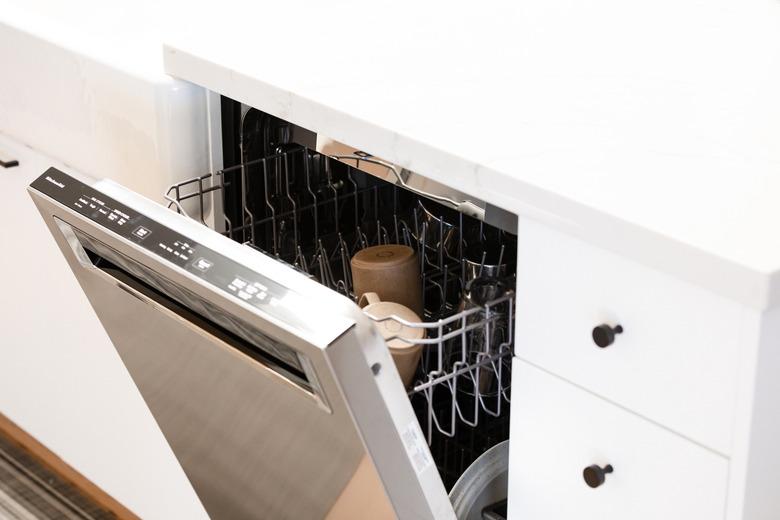7 Mistakes You're Probably Making With Your Dishwasher
Dishwashers are a many-splendored thing. Not only do they save you time on hand-washing, they're designed to give your dirty dishes a deep and thorough clean. However, no matter how wonderful having a dishwasher can be, if you aren't using yours correctly, you're not reaping the full benefits of having one. From pre-washing to cleaning and beyond, read ahead for seven mistakes you might be making with your dishwasher — and what to do instead.
1. You’re pre-washing.
Believe it or not, pre-washing your dirty dishes by hand before sticking them in the dishwasher is a waste of precious time — and water. Dishwashers and detergents are specifically designed to remove extra caked on food and grease, so save your energy (and help the planet) by bypassing any pre-washing and just throwing out (or composting) any leftover food scraps on your dishes before putting them in the dishwasher.
2. You’re dishwashing your wooden kitchen wares.
Still have the wooden spoon your mom gifted you in college? Don't wash it in the dishwasher. The heat from your dishwasher can cause your wooden utensils and cutting boards to warp and crack — so you'll add years to their life by hand-washing them with warm, soapy water instead.
3. You’re blocking the spray arms.
Never underestimate the impact of a utensil that slips through the dishwasher rack. A simple spatula can wind up blocking the rotating spray arms in your dishwasher that help disperse water and detergent, so always double check that nothing has fallen through your bottom rack before starting a dishwashing cycle.
4. You’re washing your kitchen knives.
Nothing's worse than trying to chop veggies with a dull knife — and it turns out your dishwasher may be to blame. The heavy water spray that your dishwasher releases can damage delicate blades and cause them to rust and flatten over time. Do yourself a favor and hand-wash your knives with warm soapy water so they stay sharp for longer.
5. You’re overloading.
Just like a slipped spatula can block your dishwasher's rotating arms, overcrowding your dish rack can stop the water and detergent from spreading evenly over your dishes during a wash cycle. Avoid overfilling your dishwasher by making sure no items are positioned on top of each other and that there's enough room for water to reach every one of your dish surfaces.
6. You’re not cleaning your dishwasher.
If you thought your dishwasher was a self-cleaning appliance, then it's time to think again. Experts say you should be giving your dishwasher a deep clean at least once a month to remove gunk and buildup so it can run more efficiently. Luckily, you can naturally clean and deodorize your dishwasher in no time with vinegar, baking soda, and a toothbrush — so your dishes always get the deep-clean they deserve.
7. You’re not choosing the right cycle.
Washing your dishes on a heavier cycle than necessary isn't doing you (or the environment) any favors. Along with expending unnecessary amounts of water, employing too heavy of a cycle can lead to broken and damaged dishes — so make sure you're always choosing the most appropriate cycle for each unique load.
